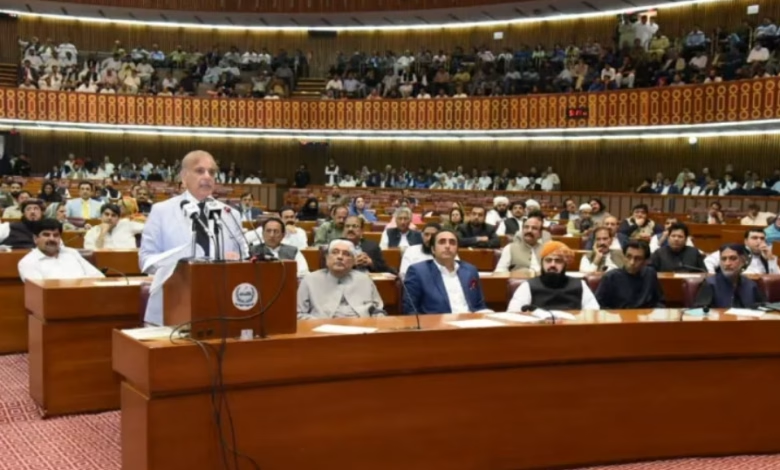Pakistan Approves Amendment Allowing Parliament to Select Chief Justice

- Pakistan's government approved amendments to empower parliament in appointing the chief justice, sidelining the judiciary favorable to Imran Khan.
- The new law mandates a parliamentary committee select the chief justice, who will serve a three-year term.
- The amendments were passed ahead of Chief Justice Qazi Faez Isa's retirement, changing the succession plan that favored pro-Khan judge Mansoor Ali Shah.
- PTI leaders criticized the amendments as undermining judicial independence and not representing the people.
Pakistan’s government has approved constitutional amendments that enhance legislative power in appointing the chief justice, a move perceived as diminishing the judiciary’s influence, particularly in light of its alleged favoritism toward jailed former Prime Minister Imran Khan.
The 26th Constitutional Amendment Bill was passed early Monday following months of negotiations and an extended session of the National Assembly, the country’s lower house of parliament.
Proponents argue the changes will promote democratic accountability by involving elected representatives in judicial appointments. However, critics express concerns about potential threats to judicial independence and the separation of powers.
This amendment comes during a period of political unrest, with Khan’s supporters alleging that his legal troubles are politically motivated. The government’s actions are seen as a significant shift in Pakistan’s political dynamics.
As the amendments are implemented, the responses from the legal community and the public will be pivotal in determining the future of judicial independence in Pakistan.
The new amendment establishes that the chief justice of the Supreme Court will be appointed by a parliamentary committee and will serve a fixed term of three years.
Relations between the government and the judiciary have deteriorated since the general elections in February, which were marred by allegations of rigging. This tension has been exacerbated by various court rulings that have favored former Prime Minister Imran Khan and his Pakistan Tehreek-e-Insaf (PTI) party.
The amendment was enacted just days before the retirement of Supreme Court Chief Justice Qazi Faez Isa. Under the previous law, Isa would have been succeeded by the next most senior judge, Mansoor Ali Shah, who has consistently delivered rulings seen as favorable to former Prime Minister Imran Khan and his Pakistan Tehreek-e-Insaf (PTI) party.
New groups of senior judges will be established to focus exclusively on constitutional matters, a key issue that has fueled recent disputes between the government and the Pakistan Tehreek-e-Insaf (PTI) in the Supreme Court.
During the bill’s passage in a predawn session, Prime Minister Shehbaz Sharif described the day as “historic,” emphasizing the affirmation of parliamentary supremacy.
Sharif stated, “Today’s 26th amendment is not just an amendment; it symbolizes national solidarity and consensus. A new sun will rise, illuminating the nation.”
His party, the Muslim League-Nawaz, achieved a two-thirds majority in support of the bill, aided by its longstanding rival-turned-partner, the Pakistan People’s Party. Additionally, some rebel PTI members also voted in favor of the reform.
However, leaders of the Pakistan Tehreek-e-Insaf (PTI), the largest bloc in parliament, have strongly criticized the amendments.
“These amendments are an attempt to suffocate a free judiciary and do not represent the will of the people of Pakistan,” stated Omar Ayub Khan, the PTI leader and opposition chief in the National Assembly. He emphasized that a government formed through rigging lacks the legitimacy to amend the constitution.
Analyst Bilal Gilani, who leads one of Pakistan’s prominent polling agencies, noted that while the amendments may offer some “wins,” such as addressing judicial activism, they also present a more troubling aspect. He argued that the changes could lead to a judiciary that is more compliant with governmental interests.
On Monday, Dawn, a leading newspaper in Pakistan, warned that the new law could escalate tensions between different branches of government. An editorial suggested that given the long-standing conflicts and divisions, these amendments might provoke a renewed standoff between the legal community and the government.
In a July ruling, the Supreme Court of Pakistan determined that the Election Commission had acted improperly by sidelining Khan’s party during the election campaign, forcing its members to run as independents over a technical violation. This ruling also granted the PTI several non-elected seats for women and religious minorities, enhancing its parliamentary representation.
Additionally, other courts have reversed Khan’s personal convictions or sentences, indicating a shifting legal landscape. Earlier this year, six judges from the Pakistan High Court accused the country’s intelligence agency of intimidating them regarding “politically consequential” cases, underscoring the fraught relationship between the judiciary and political power.
Khan continues to enjoy significant popularity and actively challenges the establishment through regular protests, even as he sits in jail on charges he claims are politically motivated. His removal from power in a 2022 no-confidence vote is attributed by analysts to his falling out of favor with the military leadership.
Despite the risks, Khan has mounted a defiant campaign against the military—an especially sensitive issue in a country with a history of army dominance. This opposition has resulted in a harsh crackdown on his leadership and his supporters, intensifying the political turmoil surrounding his imprisonment.






